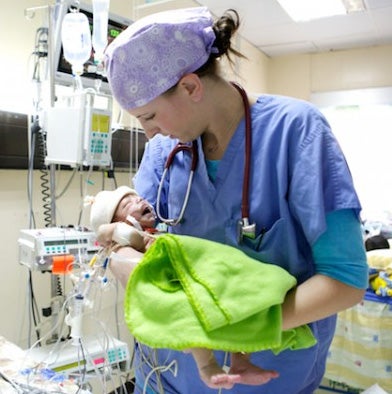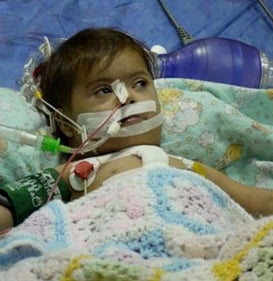
Megan Spurny, RRT, MHS, a Boise State University respiratory care faculty member and alumnus, completed an 18-day medical mission. Spurny had the privilege of changing the lives for 16 Iraqi children, educating the international medical team and the local Iraq medical practitioners about respiratory care practices and equipment, and improving the medical resources in Nasiriyah, Iraq with a generous donation from Norco Inc.
Spurny joined an International Children’s Heart Foundation (ICHF) team of international medical providers to spend Jan. 7-24 in Nasiriyah to perform medical procedures on children with congenital heart defects and to educate and support the local medical community in building a sustainable and functional cardiac care program.

Prior to her departure from the States, Spurny solicited Norco’s assistance in bringing much-needed supplies to Iraq. Some supplies that are common in the States are either absent or re-used, increasing the risk of infection, in developing countries. Norco generously sent Spurny with enough ventilator circuits and post-operative respiratory supplies so that each of the children operated on during the mission had clean supplies for their recovery. The Nasiriyah Cardiac Center will continue to use the supplies as they build their cardiac care program.
While Spurny had many medical duties during the mission, one of the most important responsibilities was to educate those responsible for respiratory care practices about ventilator management, acid-base management, patient assessment, and post-operative respiratory care. Through her role as an educator and mentor, Spurny sought to empower the Iraq team members to become self-sufficient health care practitioners.
Spurny, a Registered Respiratory Therapist, was joined by a cardiologist from Iceland, two intensivists and an anesthesiologist from Belarus, nurses from Pakistan, the United Kingdom and the United States, a biomedical engineer and a perfusionist from the United States and the founder of ICHF and primary surgeon, Dr. William Novick, also of the United States.
Spurny’s Boise State education was a direct influence on her involvement in medical missions, including this ICHF mission to Iraq. While she was a Master of Health Science student at Boise State, faculty member Jim Girvan, MPH, PhD asked Spurny’s class “Do you believe health care is a privilege or a right?” Spurny has been reflecting on this question ever since. As she traveled to Peru, Bolivia, and now Iraq, she has come to appreciate the opportunities to attend school, travel the world, and have her most basic health care needs met.
“While the answer to Dr. Girvan’s question will never be black and white, I think it is important for humanity to keep in mind that some things are bigger than us,” Spurny shares. “Some things are bigger than the everyday, and often mundane things we consider to be ‘our world.’ Some problems require human beings to band together and provide for one another while constantly reevaluating our personal beliefs.”
Novick founded ICHF in order to bring the skills, technology and knowledge to diagnose and care for children with congenital heart disease, the number one birth defect in the world, to developing countries that request help. The foundation operates regardless of country of origin, race, religion or gender.

A primary task for the foundation is to work closely with the local medical community during medical missions to build cardiac care programs that will continue on their own long after the ICHF team departs. ICHF has performed nearly 5,000 operations in a handful of countries where pediatric patients are unable to obtain the surgeries they need.
Spurny’s interest in the need for respiratory care practitioners in rural areas has led her on several international medical missions, but none seemed as sustainable as the missions of ICHF. ICHF seeks respiratory therapists for its mission trips as the therapists make a critical difference in the post-operative care of the patients.
Spurny continues to commit to bringing health care, specifically respiratory care, to those who need it. She encourages her students find the endless opportunities for respiratory care practitioners and to embrace a new paradigm of “those who can do, should do.” Spurny sees her own opportunity to shape the world and hopes that her students will recognize their own opportunities as well.